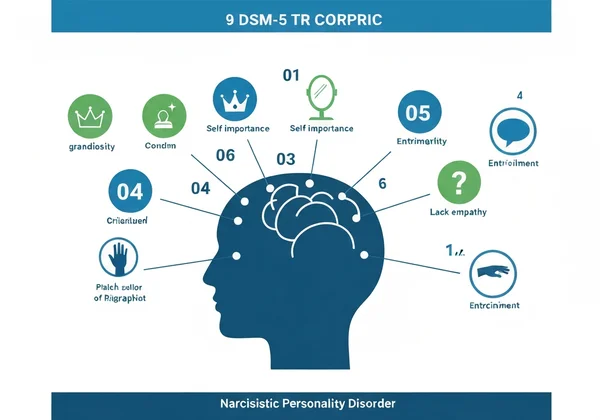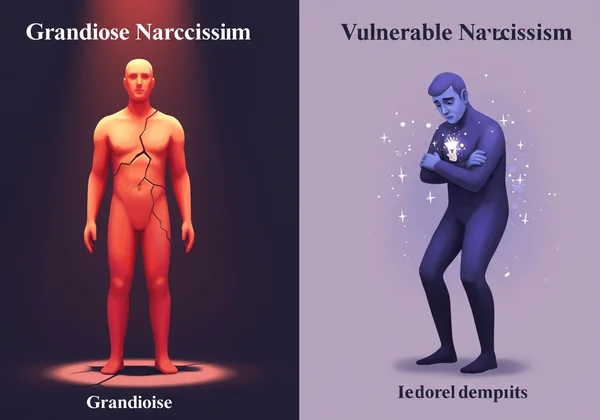Guida al Test DNP: Disturbo Narcisistico di Personalità
November 13, 2025 | By Clara Jennings
Il termine "narcisista" è usato frequentemente nella cultura odierna, spesso per descrivere qualcuno che sembra vanitoso o egocentrico. Ma cosa significa veramente avere tratti narcisistici, e quando questi superano il limite trasformandosi in un disturbo di personalità diagnosticabile? Questa guida elimina il rumore, offrendo uno sguardo chiaro e compassionevole sul Disturbo Narcisistico di Personalità (DNP). Se stai cercando chiarezza per te stesso o per una persona cara, comprendere i fondamenti è il primo passo. Il nostro test DNP gratuito è un punto di partenza confidenziale per questo viaggio di scoperta di sé.
Perché Comprendere il DNP è Importante per Sé Stessi e per le Relazioni
Comprendere il DNP non è solo accademico; è uno strumento vitale per l'introspezione personale e per costruire relazioni più sane. Per coloro che mettono in discussione i propri comportamenti, può illuminare schemi che causano attrito e disagio. Per coloro che hanno a che fare con un partner, un familiare o un collega che mostra questi tratti, fornisce un quadro per comprendere le loro azioni e proteggere il proprio benessere. Questa conoscenza ti consente di prendere decisioni informate, stabilire confini e cercare il supporto appropriato.
Cos'è un Narcisista? Comprendere il Disturbo Narcisistico di Personalità
Fondamentalmente, il Disturbo Narcisistico di Personalità è una complessa condizione di salute mentale caratterizzata da un modello pervasivo di grandiosità, un costante bisogno di ammirazione e una mancanza di empatia per gli altri. È uno dei diversi tipi di disturbi di personalità riconosciuti dalla comunità clinica. Comprendere il DNP richiede di guardare oltre l'arroganza superficiale e di vedere l'insicurezza profonda e la disregolazione emotiva che spesso si celano sotto.

Definire il DNP: Oltre l'Amore per Sé Stessi o l'Arroganza
È fondamentale distinguere tra una sana autostima e i tratti del DNP. La fiducia è radicata in un autentico successo e valore di sé, consentendo umiltà e connessione. Il DNP, tuttavia, implica un senso di importanza di sé gonfiato e fragile che dipende dal riconoscimento esterno. Non si tratta solo di amare se stessi; si tratta di un disperato bisogno di essere visti come superiori, che spesso maschera una profonda incapacità di sostenere un senso stabile del proprio valore. Se ti stai chiedendo dove ti collochi in questo spettro, uno strumento di screening online può offrire una prospettiva iniziale.
I 9 Criteri del DSM-5 TR: Identificare i Segni Fondamentali del DNP
Il Manuale Diagnostico e Statistico dei Disturbi Mentali, Quinta Edizione, Revisione del Testo (DSM-5-TR), fornisce lo standard autorevole per la diagnosi. Una persona deve mostrare almeno cinque dei seguenti nove criteri per essere formalmente diagnosticata da un professionista qualificato:

- Un senso grandioso di importanza di sé: Esagerare i successi e i talenti, aspettandosi di essere riconosciuto come superiore senza risultati commisurati.
- Una preoccupazione per fantasie di successo illimitato, potere, brillantezza, bellezza o amore ideale: Credere di essere destinato alla grandezza.
- La convinzione di essere "speciale" e unico: Sentire di poter essere compreso solo da, o di doversi associare con, altre persone o istituzioni speciali o di alto status.
- Un bisogno di eccessiva ammirazione: Richiedere costante attenzione e lodi dagli altri per alimentare la propria autostima.
- Un senso di pretesa: Avere aspettative irragionevoli di trattamenti particolarmente favorevoli o di un'automatica conformità alle proprie aspettative.
- Comportamento interpersonale di sfruttamento: Approfittarsi degli altri per raggiungere i propri scopi.
- Mancanza di empatia: Essere riluttante o incapace di riconoscere o identificarsi con i sentimenti e le esigenze degli altri.
- Invidia degli altri o la convinzione che gli altri siano invidiosi di loro: Spesso sentirsi gelosi dei successi altrui pur credendo contemporaneamente che tutti gli altri siano gelosi di loro.
- Una dimostrazione di comportamenti o atteggiamenti arroganti e altezzosi: Mostrare un atteggiamento condiscendente e altezzoso.
Riconoscere questi segni è il primo passo verso la comprensione. Un test per il DNP confidenziale può aiutarti a riflettere se questi tratti risuonano con la tua esperienza.
Esplorare il Panorama: Tipi, Cause e Prevalenza del DNP
Il narcisismo non è una condizione universale. Si manifesta in modi diversi e le sue origini sono ritenute una complessa interazione di genetica, neurobiologia ed esperienze di vita precoci. Approfondire questi aspetti fornisce un quadro più sfumato del disturbo.
Narcisismo Grandioso vs. Vulnerabile: Svelare le Differenze
Sebbene non siano categorie diagnostiche ufficiali, clinici e ricercatori osservano spesso due presentazioni primarie del narcisismo:
- Narcisismo Grandioso: Questo è il tipo classico, estroverso e palese. Gli individui sono spesso affascinanti, arroganti e sfacciatamente presuntuosi. Cercano apertamente l'ammirazione e sono meno propensi a mostrare segni di ansia o depressione sottostanti.
- Narcisismo Vulnerabile (o Coperto): Questo tipo si manifesta in modo più introverso ed è caratterizzato da ipersensibilità. Sebbene nutrano gli stessi sentimenti di grandiosità, li esprimono attraverso la difensività, l'ansia e una mentalità vittimistica quando la loro percepita superiorità viene messa in discussione. Sono più inclini a sentimenti di vergogna e vuoto.
Cosa Causa il Disturbo Narcisistico di Personalità? Geni, Ambiente ed Educazione
Non esiste una singola causa del DNP. La ricerca suggerisce che deriva da una combinazione di fattori:
- Genetica: Avere una storia familiare di disturbi di personalità può aumentare il rischio.
- Ambiente: Le esperienze della prima infanzia sono considerate un ruolo significativo. Ciò può includere eccessiva adorazione e lodi non fondate sulla realtà, o al contrario, critiche severe, abusi o negligenze che favoriscono la necessità di un'immagine di sé difensiva e grandiosa.
- Neurobiologia: Alcuni studi suggeriscono potenziali connessioni tra il DNP e la struttura delle aree cerebrali legate all'empatia e alla regolazione emotiva.
Navigare la Vita con il DNP: Impatti, Coping e Percorsi di Guarigione
I tratti associati al DNP possono avere un impatto profondo su quasi ogni aspetto della vita di un individuo, dalle relazioni personali al successo professionale. Tuttavia, comprendere queste sfide apre anche la porta a strategie di coping e potenziali percorsi di cambiamento.
Come il DNP Impatta le Relazioni: Famiglia, Amicizie e Legami Romantici
I deficit fondamentali nell'empatia e il bisogno di ammirazione rendono incredibilmente difficile formare e mantenere relazioni sane e reciproche. Partner, familiari e amici spesso si sentono svalutati, manipolati o usati. La dinamica relazionale ruota frequentemente attorno ai bisogni dell'individuo con tratti narcisistici, lasciando gli altri emotivamente esausti e con la sensazione di non essere ascoltati. Se questo ti sembra familiare, potrebbe essere il momento di esplorare i tuoi tratti per una maggiore chiarezza.
Strategie per Affrontare l'Interazione con Tratti Narcisistici
Se sei in una relazione con qualcuno che mostra forti tratti narcisistici, proteggere la tua salute mentale è fondamentale. Le strategie chiave includono:
- Stabilire Confini Fermi: Definire chiaramente e con calma ciò che accetterai e ciò che non accetterai.
- Evitare JADE (Giustificare, Argomentare, Difendere, Spiegare): Impegnarsi in lotte di potere è spesso inutile. Dichiara il tuo confine e disimpegnati.
- Concentrarsi sui Propri Bisogni: Costruire un forte sistema di supporto e investire in attività che ti portano gioia e convalidano il tuo valore di sé.
- Gestire le Aspettative: Comprendere che cambiare un'altra persona non è in tuo potere.
Il Disturbo Narcisistico di Personalità Può Essere Trattato? Percorsi di Terapia e Cambiamento
Sebbene il DNP sia difficile da trattare, il cambiamento è possibile per chi è motivato. La psicoterapia a lungo termine è l'approccio terapeutico principale. Terapie come la Terapia Cognitivo-Comportamentale (TCC) o la Schema Therapy possono aiutare gli individui a identificare e cambiare schemi di pensiero distruttivi, imparare a relazionarsi con gli altri in modo più empatico e sviluppare un senso di autostima più stabile. Il viaggio inizia con la consapevolezza, che uno strumento di screening per il DNP può aiutare a iniziare.

Il Tuo Viaggio Verso la Chiarezza: Fare i Prossimi Passi Verso la Comprensione
Navigare le complessità del Disturbo Narcisistico di Personalità, sia in te stesso che in qualcun altro, può sembrare opprimente. Questa guida serve come una mappa fondamentale, delineando i segni chiave, le cause e gli impatti di questa condizione. La vera comprensione è un processo di apprendimento, riflessione e di compiere passi coraggiosi verso l'auto-consapevolezza. Ricorda, cercare chiarezza è un segno di forza, non di debolezza.
Potenzia Te Stesso: Inizia la Tua Scoperta di Sé con il Nostro Test DNP Gratuito
Il tuo viaggio verso l'intuizione inizia con un singolo passo. Se qualcosa di ciò che hai letto qui ha risuonato con te, ti incoraggiamo a passare dalla lettura passiva all'esplorazione attiva. Il nostro test narcisista confidenziale e gratuito, basato sui criteri del DSM-5 TR, è progettato per essere un primo passo sicuro e accessibile. Non è una diagnosi, ma uno strumento privato per aiutarti a ottenere una preziosa auto-consapevolezza e decidere i tuoi prossimi passi. Inizia il tuo test ora per ottenere chiarezza.
Domande Frequenti sul Disturbo Narcisistico di Personalità
Cos'è un test DNP?
Un test DNP è uno strumento di screening progettato per aiutare gli individui a identificare se mostrano tratti associati al Disturbo Narcisistico di Personalità. Test di qualità, come quello proposto sul nostro sito, si basano sui criteri clinici del DSM-5 TR. Serve come una preliminare autovalutazione, fornendo un punteggio e intuizioni che possono essere un punto di partenza per ulteriori riflessioni o consultazioni professionali.
Come faccio a verificare se ho il DNP?
L'unico modo per ricevere una diagnosi formale di DNP è attraverso una valutazione completa da parte di un professionista della salute mentale qualificato, come uno psichiatra o uno psicologo clinico. Tuttavia, puoi iniziare a esplorare questa domanda riflettendo onestamente sui 9 criteri diagnostici e facendo un affidabile test per il narcisismo online come primo passo verso l'autovalutazione.
Quali sono i 9 segni del DNP?
I 9 segni ufficiali del DNP, come elencati nel DSM-5 TR, sono: un senso grandioso di importanza di sé, una preoccupazione per fantasie di successo, la convinzione della propria specialità, un bisogno di eccessiva ammirazione, un senso di pretesa, comportamento di sfruttamento, mancanza di empatia, invidia degli altri e atteggiamenti arroganti.
I narcisisti sanno di essere narcisisti?
Questa è una domanda complessa. Molti individui con DNP mancano di auto-consapevolezza e non vedono i loro comportamenti come problematici (uno stato noto come essere ego-sintonico (cioè, i loro comportamenti sono percepiti come coerenti con il proprio sé)). Spesso credono che il problema risieda in tutti gli altri. Tuttavia, alcuni, in particolare quelli che sperimentano significativi fallimenti nella vita o che intraprendono una terapia, possono sviluppare un certo grado di intuizione sui loro schemi e sul dolore che causano.
Sono narcisista o autistico?
Sebbene sia il DNP che il Disturbo dello Spettro Autistico (DSA) possano comportare difficoltà nell'interazione sociale, le loro ragioni sottostanti sono molto diverse. Nel DNP, la mancanza di empatia è tipicamente radicata nell'auto-preoccupazione e nella svalutazione degli altri. Nel DSA, le difficoltà sociali spesso derivano da difficoltà nell'elaborazione dei segnali sociali e da un modo diverso di sperimentare ed esprimere l'empatia, non da una sua mancanza. È necessaria una valutazione professionale per distinguerli.